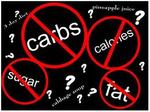1. Easy on the Carbs! The first is the information above, about the two hormones responsible for fat deposition and use. If your low calories are mostly carbohydrates (especially the high-density ones like sugar, bread, rice, pasta, baked goods, potatoes, alcohol) the hormone landscape will not allow the low calorie physics to be very effective. Hormonally, you're still telling your body to store fat, not burn it!
2. Lack of resistance training. The second thing is that if your low calorie diet does not include some muscle building exercise, some of the weight you lose will be muscle (30-50%). Remember, each .5 kgs of muscle burns 50 calories a day just to maintain a temperature of 98.6 degrees. If you lose 10kgs and half of it is muscle lost, that's 500 calories a day that your metabolism just went down. OOPS!!!! Not what we want!
|
 |
3. Really low calories. The third thing that can happen to sabotage weight loss is the mistaken notion that if low calorie intake is good then REALLY low calories must be REALLY good! NO! When your calories are too low, you down-regulate metabolism. This effect has to do with the thyroid hormones-you know-the ones responsible for metabolism and many other systems of the body.
The details are beyond the scope of this article, but keeping calories in the low-enough, but not-too-low range is important. Rule of thumb for women, probably around 1400 calories a day is the lower limit of effective low calorie diet. For men perhaps around 1700-1800, but these are estimates. The numbers might be different for different bodies. If you would like help on figuring these numbers, find a personal trainer or health care professional who is knowledgeable and get help!
4. Skipping Meals. The fourth thing that sabotages weight loss is skipping meals. Well, this one and the third, are closely related. When your calories are too low, or when you skip meals, you send a message to your body that you're in a famine. Remember, there was a time when humans experienced famines now and then-either seasonally or as part of natural catastrophes of one sort or another. In order for the human race to survive, it needed a physiologic strategy to get through a famine without starving to death.
You and I still have the same mechanisms now, even though we have never seen a real famine. But if you regularly skip breakfast or dinner, or both, your body THINKS it's in a famine and here's what happens.
 |
As a survival mechanism, it gets VERY efficient at holding onto every calorie you eat. The structure of the cell membrane around fat cells physically changes to make survival possible. Normally fat cell membranes let fat in and fat out equally. But when your body responds to famine conditions, the pathways that let fat into the fat cells become super efficient (extra permeable) so it's easy for fat to be stored. The pathways that let fat OUT of the fat cells become less permeable-the cell holds onto it tighter. |
So what is the solution? Work with the way your body works. Understand the physiology. Use that knowledge to make the weight loss a reality!
Eat every 2-1/2 to three hours, and even snacks should include some protein. By doing so you tell your body it's not in a famine! An important side effect of that strategy, too, is that your blood sugar will stabilize and with it your moods and energy level.
Without exception, those who have successfully lost fat (and kept it off) have done so by following the below principles:
· Increase protein and decrease the high-density carbs
· Eat smaller meals more often (5-8 times a day)
· Exercise vigorously· Drink more water
· Eat in order to live, don't use food as recreation.
· Ultimately, declining hormones of middle age need to be addressed (for mood, appetite and metabolic problems)
by Mike McCauley, Personal Trainer
first published on Go Figure 2007 |






